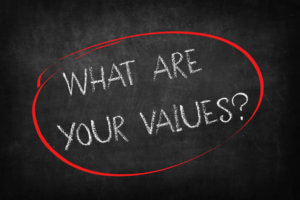
Why aligning values with behaviours is key to sustainable performance
Who are we?
We are our values, beliefs and behaviours. Our moral principles or accepted standards which guide our thoughts, feelings and ultimately our actions.
If you ask your people to take action which is in alignment with their values and beliefs will they do it?
Absolutely! 100%.
If you ask your people to take action that is not aligned with their values and beliefs, they might perform in the short term, they might do it because they think ‘they have to’ but the one thing for certain is they certainly will not do it over the long term.
It will not become habitual.
In fact, it will create such conflicts and tensions with their personal values it could ultimately result in them leaving the organisation.

Why?
Because people never consistently do who they aren’t. That’s a clumsy play on words, but it’s deliberate. Let me explain …
If you ask your people to take actions ALIGNED with their values and beliefs, they will do it every single day of the week.
Why?
Because people WILL consistently do who they are.
Misalignment of personal and company values is cited as one of the top three reasons people leave an organisation. Leaders misunderstand how values inflexibly influence behaviour. I’ve met with many leaders, who are frustrated because objectives are not being met, and I’ve been engaged to help implement an employee behaviour change programme.
My starting point is always to positively challenge their thinking because they’re attempting to get the wrong result.
Behaviours aren’t whims; they are driven by our core values.
It’s no good even trying behaviour change unless we understand each employee’s individual values and how they align with those of the organisation.
This principle is why there is a growing trend of ‘Values-Based recruitment’, to ensure there is alignment and cultural fit between the two parties from day 1.
Can you change someone’s values and beliefs?
If you cannot change behaviour without understanding values and beliefs, can you change the values and beliefs themselves?
Values are deep rooted, often based on religion, traditions, learnt from our parents, and are not necessarily the result of conscious decision. Over time, you may be able to change them, or at least influence them, but it’s difficult. It’s much easier to find people whose values align with yours in the first place.
Beliefs on the other hand can be easily changed when they are challenged by factually based information that contradicts them. Beliefs lead us to act in very deliberate ways.
Unless your people can make a connection between their actions and their values and beliefs, they may be incapable of delivering a sustained result.
The store card dilemma

One of my clients was the Head of Sales for a large retail company. His top salesperson outsold all the other salespeople in his area by a mile. But when the department store chain decided to introduce a store credit card and the sales team were targeted with signing customers up something interesting began to happen. The top sales- person didn’t sell a single one. After six months, the manager sat him down and said: ‘Look these are part of your objectives. What’s going on?’
Being a smart manager, he didn’t just insist that the salesperson get on with it; he went looking for an underlying problem. He discovered the top salesperson had been raised by his parents on a core belief to never have debt. Therefore, selling credit cards was completely at odds with his core values and beliefs.
Now the manager had a choice; micro manage his ‘poor performance’ in which case he would leave, or alternatively make an intelligent exception to the rule for a high performer who in every other aspect was a model exemplar of behavioural excellence. I’m pleased to say on this occasion he chose the latter option.
Aligning your people’s personal values and beliefs with those of the organisation is critical to unlocking their latent potential.
Remember the flip of the expression: ‘people never consistently do who they aren’t’ is ‘people will consistently do who they are!’
Considerations when creating your Values

Your values should be the guiding principles that absolutely define you. Most business owners, business leaders, and entrepreneurs set values without thinking enough about their real passion and deep-seated beliefs.
Too often, they list values that should actually be a given. For example, in 2015, the Harvard Business Review said that 55% of companies in the Fortune 100 list had ‘Integrity’ as a value and described it as a ‘permission to play’ value that any business should have by default.
Most organisations generally major on values for internal use, though admittedly there is a shift in this thinking. Santander, after 18 months of embedding their values (SIMPLE, PERSONAL, FAIR) and creating alignment in the hearts and minds of its people, began to use them in its customer marketing. That really puts them to the test; nothing will make your people live up to the promise quite like the values being played back to you by customers as the expected standards.
Values in ACTION
Values are not designed to be passive and should be a fundamental element in your performance review process as a key tool for validation and measurement of behavioural performance.
Particularly when they are underpinned by winning and derailing behaviours; winning behaviours focus on excellence in action and are the model standard of best practice, and derailing behaviours raise conscious awareness of the behaviours that will not be accepted.
A common set of values and defined behaviours will create clarity on what excellence looks like, feels like and acts like. So, if your Vision/Purpose determines where you’re going, your Values/Behaviours will determine precisely how you’re going to get there!
Do you have a clear set of values for your business?
Are they underpinned by a defined set of behaviours, which propel you towards your goal of excellence in everything you do?
Other topics in this series ‘5 surefire methods for building a high performing organisation’;
#1 A Vision / Purpose to infuse work with purpose and meaning
#2 A set of Values & Behaviours to propel you towards your goal
#3 A clear Strategic Plan laying out your goals, priorities and direction of travel
#4 Being disciplined in the execution of the plan
#5 A performance culture at the heart of the organisation

